A Brief Colonial History Of Ceylon(SriLanka)
Sri Lanka: One Island Two Nations
A Brief Colonial History Of Ceylon(SriLanka)
Sri Lanka: One Island Two Nations
(Full Story)
Search This Blog
Back to 500BC.
==========================
Thiranjala Weerasinghe sj.- One Island Two Nations
?????????????????????????????????????????????????Wednesday, April 1, 2020
As the wealthy quaff wine in comfort, India’s poor are thrown to the wolves
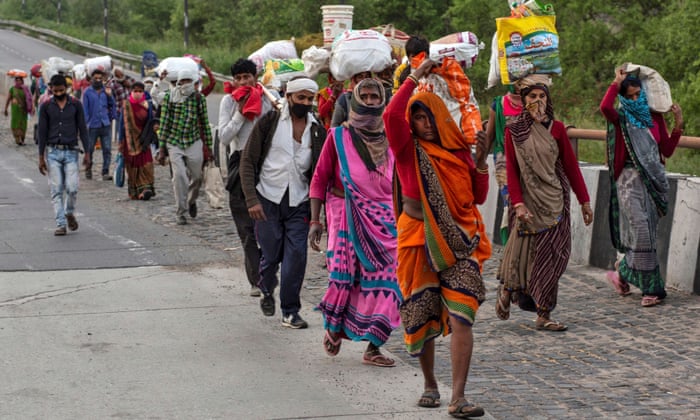 Migrant workers in New Delhi walk home to their village following the lockdown. Photograph: Danish Siddiqui/Reuters
Migrant workers in New Delhi walk home to their village following the lockdown. Photograph: Danish Siddiqui/ReutersAmrit Dhillon in New Delhi-
 With the country in lockdown because of coronavirus, deep social inequalities have been exposed more sharply than ever
With the country in lockdown because of coronavirus, deep social inequalities have been exposed more sharply than ever“Sauvignon blanc or viognier”? As the words left my mouth, my son and I locked eyes, our expressions flashing from shame-faced to half laughing at the irony. My live-in maid Ranjita had just laid out dinner and, since the fish and lyonnaise potatoes looked appetising, I thought it deserved a bottle of wine.
For people like us, under lockdown, the existential questions that punctuate our daily lives are: is it to be Curb Your Enthusiasm or Line of Duty, Netflix or Hotstar?
For millions of rich and middle-class people in India, the lockdown is almost an enforced period of recreation or a chance for self-improvement. Time to enrol for an online art appreciation course, learn the intricacies of Thai cooking, take up gardening, learn a language, take up the guitar, go for a detox by eating healthy food.
It’s a good time to start War and Peace. Watch those Visconti classics. Or finish Proust’s À La Recherche du Temps Perdu, or rather just the first volume. It requires several lockdowns to finish the whole novel.
If, like me, you have a live-in maid who happens to have picked up some beautician skills, you are “condemned” to confinement in a spa. Shall I have a facial today? Or a pedicure? No, let’s settle for a massage. It will relieve my lockdown tension.
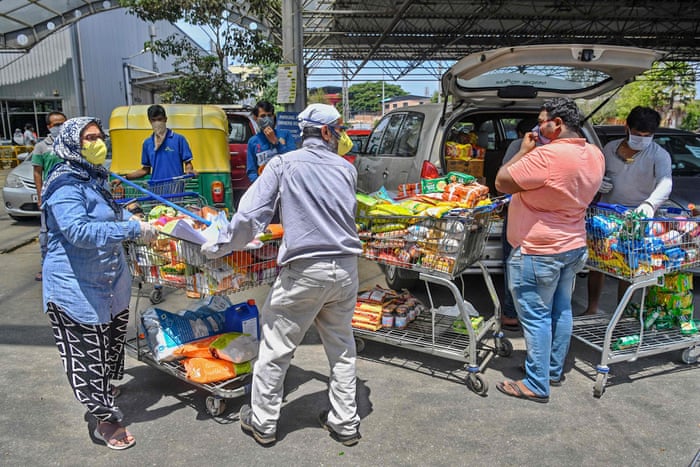
People push loaded trolleys outside a supermarket in Bengaluru. Photograph: Manjunath Kiran/AFP via Getty Images
The fridge is well stocked with food. Not, I hasten to add, because I have hoarded – I very deliberately refused to do something so cheap – but because Ranjita happened to do a big shop just a few days before Narendra Modi announced a nationwide lockdown. There is more wine, along with single malt, vodka and rum.
I have some money in the bank. I even have cash because my sister, when she left India after a holiday to return to Oxford (she caught literally the last flight out of the country before flights to and from India were stopped), paid me for the new ticket we had to book to get her home. Hell, I’m even able to earn some money sitting indoors, if this article gets published.
What the lockdown has done, just two days in, is to magnify a hundredfold the social inequality in India until you feel as though it is screaming at you, wild-eyed and with bared teeth.
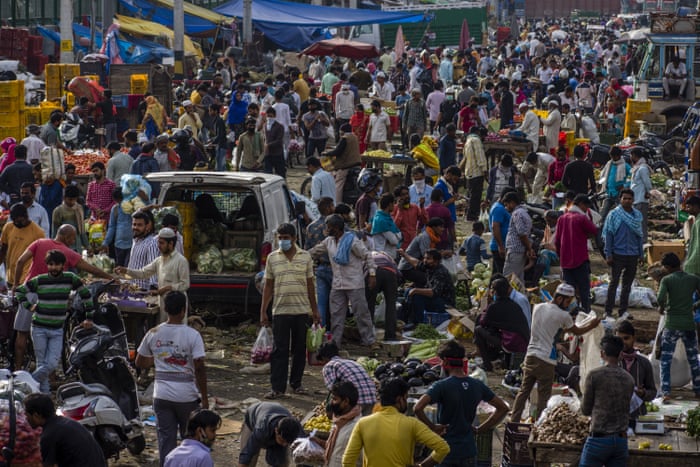
A market in New Delhi was still packed on Thursday despite the lockdown. Photograph: Getty Images
Social inequality has always been extreme here. Nothing new about that. Waiting at the traffic lights in your air-conditioned car (a kind of gleaming sealed egg, as novelist Aravind Adiga puts it in White Tiger), in your nice fresh clothes on your way to meet a friend for lunch at an elegant restaurant that is going to cost what could feed a family of four for a month, a man comes up to the window selling slices of coconut or crisps and the 250 rupees (£2.71) that he earns in a day will go towards feeding his family, if he is lucky.
With the lockdown, the man at the traffic lights has been immobilised. The lives of millions and millions of Indians are being shattered by the lockdown to an unimaginable degree and the contrast between their suffering and those who can comfortably ride out this storm is so sharp that it provokes an intake of breath. In Europe and the US where societies are more egalitarian, the lockdown experience is not marked by the same sharp disparities as in India.
We are staying indoors, all cosy and cocooned in our nice spacious homes with sofas and lamps, snug as a bug in a rug and busy on our laptops and phones, safe and protected. The poor have been thrown to the wolves. The government is doing its best to offer relief to help them survive but they are in extremis in every single respect: no work, money or food and, in many cases no family around for affection and support.
Casual workers are paid by the day. If they don’t work for a day, their wallets are empty. The first thing you notice when you walk into the home of a poor Indian is the absence of any processed or packaged foods. There are no jars, packets, bottles or boxes, nothing that can last. No packet of biscuits or noodles or a can of beans. There is never enough money to buy these superfluous items; the money is enough only for the vegetables or dal needed for one meal, and even the quantity of that meal is carefully calibrated to appetite as there is no fridge to keep any leftovers.
If they need medicines, they ask the chemist for the number of pills – paracetamol, say – they need for that day rather than buying a strip.
The crucial difference is that the poor have no buffer, no reserves of anything, whether money, food or medicines. Life is lived on the edge. While we can talk with our loved ones in other cities or countries on video calls or Facetime, they won’t have smartphones or won’t have the money to pay for packages with enough bandwidth.
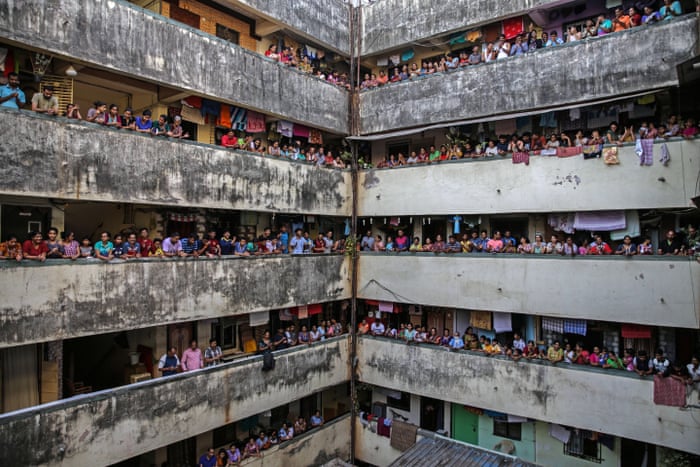
The response in Mumbai to Narendra Modi’s call for a show of support for medical staff. Photograph: Divyakant Solanki/EPA
The lockdown is necessary, no doubt, but it is a catastrophe for poor Indians. Some families at least live together in urban slums, but millions of migrant labourers are separated from their wives, parents and children back in the village. Lockdown means being confined to dingy cells that pass for rented accommodation, usually shared with six or seven other labourers.
In pre-Covid-19 days, they could spend some time outside these cells, chatting with others on the stairs or landings of their tenements, inhaling some of Delhi’s particulate matter. Now social distancing has made even that impossible.
Former maid Pushpa used to spend the day with her toddler in a tiny rented room while her husband and in-laws went out to work. Now all of them are locked up in that one room 24/7.
The lockdown has stripped the poor of the one thing that allowed them to hang on to a shred of dignity: work. When a poor Indian saw a rich man rushing off to work in his car, getting busy to support his family, he could feel that he too was working to be able to put food on the table that evening for his children. The lockdown has taken away this function and rendered him truly helpless.
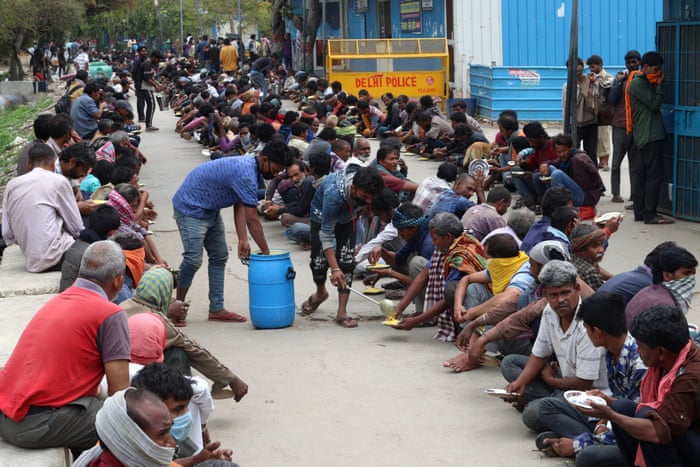
Food aid being distributed at a government shelter in New Delhi on Thursday. Photograph: Anadolu Agency via Getty Images
Weirdest of all, none of this suffering is visible. Homebound as the rich are, the poor have become truly invisible, apart from the images on the news and in the papers. They have been walled off. And yet you can feel it. In one passage, Proust talks of how, as a child, he could experience the summer heat outside more intensely and vividly, lying inside his darkened bedroom, than he could if he had been outside in the bright sunshine. That is what some of us are feeling now, safe inside our homes while the suffering happens outside somewhere.
And yet … yet, true to habit, trivial thoughts keep intruding. What if I can’t get any hair dye? I don’t want to emerge from the lockdown looking like a badger.
